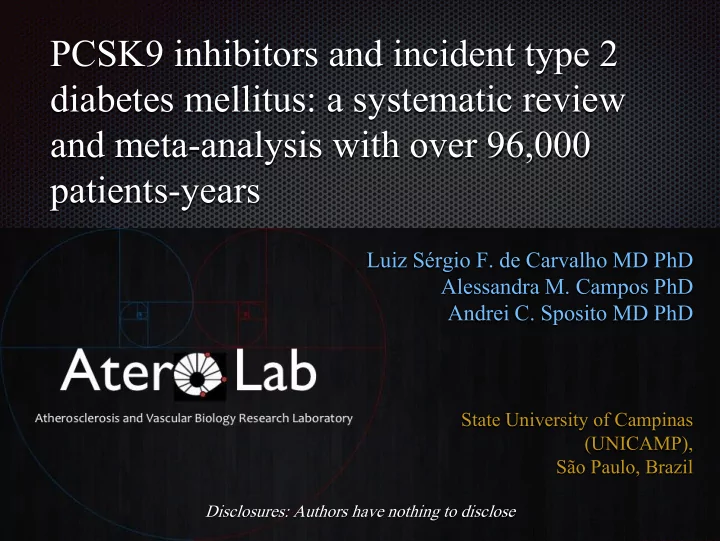

PCSK9 inhibitors and incident type 2 diabetes mellitus: a systematic review and meta-analysis with over 96,000 patients-years Luiz Sérgio F. de Carvalho MD PhD Alessandra M. Campos PhD Andrei C. Sposito MD PhD State University of Campinas (UNICAMP), São Paulo, Brazil Disclosures: Authors have nothing to disclose
Declaration of interest Authors declare no competing interests
Genetic variants of PCSK9 demonstrate its importance in regulating LDL levels PCSK9 Gain of Function (GoF) PCSK9 Loss of Function (LoF) = Less LDL-Rs 1,3,5 = More LDL-Rs 1,4,5 Mutations in the human PCSK9 gene that lead to a loss of PCSK9 function are found in 1 – 3% of the population 1 – 3 LDL-C, low-density lipoprotein cholesterol; LDL-R, low-density lipoprotein receptor; PCSK9, proprotein convertase subtilisin/kexin type 9. Adapted from: 1. Horton JD, et al. J Lipid Res 2009;50:S172 – 7; 2. Lakoski SG, et al. J Clin Endocrinol Metab 2009;94:2537 – 43; 3. Abifadel M, et al. Hum Mutat 2009;30:520 – 9; 4. Cohen J, et al. Nat Genet 2005;37:161 – 5; 5. Steinberg D, et al. PNAS 2009;106:9546 – 7.
Reduction of LDL-C and cardiovascular events with PCSK9 inhibitors and statins Ference BA et al. Eur Heart J 2017; August 14 (In press)
PCSK9 loss-of-function genetic variant is associated with pre-diabetes and diabetes Ference BA et al. N Engl J Med 2016;375:2144-53
High colesterol content in pancreatic beta cell trigger impaired insulin secretion Roehrich ME et al. J Biol Chem . 2003;278(20):18368 – 75 Brunham LR et al. Nature Med . 2007;13:340 – 347 Rutti S et al. Endocrinology . 2009;150(10):4521 – 30.
Inclusion criteria (i) Study design: phase 2 or 3 RCT; (ii) Study population: participants with familial or non-familial hypercholesterolemia; (iii) Study intervention: participants in the treatment group received PCSK9i versus control group, who received placebo with or without other lipid-lowering therapy; (iv) Treatment duration: 12 weeks or longer.
PCSK9i associated with higher HbA1c by 0.032% (0.011 - 0.050) - weighted mean difference
PCSK9i associated with higher fasting plasma glucose by 1.88 mg/dL (0.91 to 2.68) - weighted mean difference
What about PCSK9 inhibitors and the risk of incident type 2 diabetes?
PCSK9i did not increase the risk of incident type 2 diabetes [mean follow-up 1.5 year]
Change in LDL-C (per 10 mg/dL) -2.35% (95% CI -4.41 to -0.29%) p-value=0.029*
Duration of treatment (per month) +0.51% (95% CI 0.06 to 0.95%) p-value=0.026*
Limitations Study-level nature Rarity of the clinical outcome Relatively short-term follow-up Lack of information on the concomitant use and up or down-titration of antidiabetic medications
Conclusions At short-term, PCSK9i therapy favors a small, but significant increase in plasma glycaemia and HbA1c. The effect on type 2 diabetes risk is only apparent among individuals who achieved very low levels of LDL-C after treatment.
Recommend
More recommend